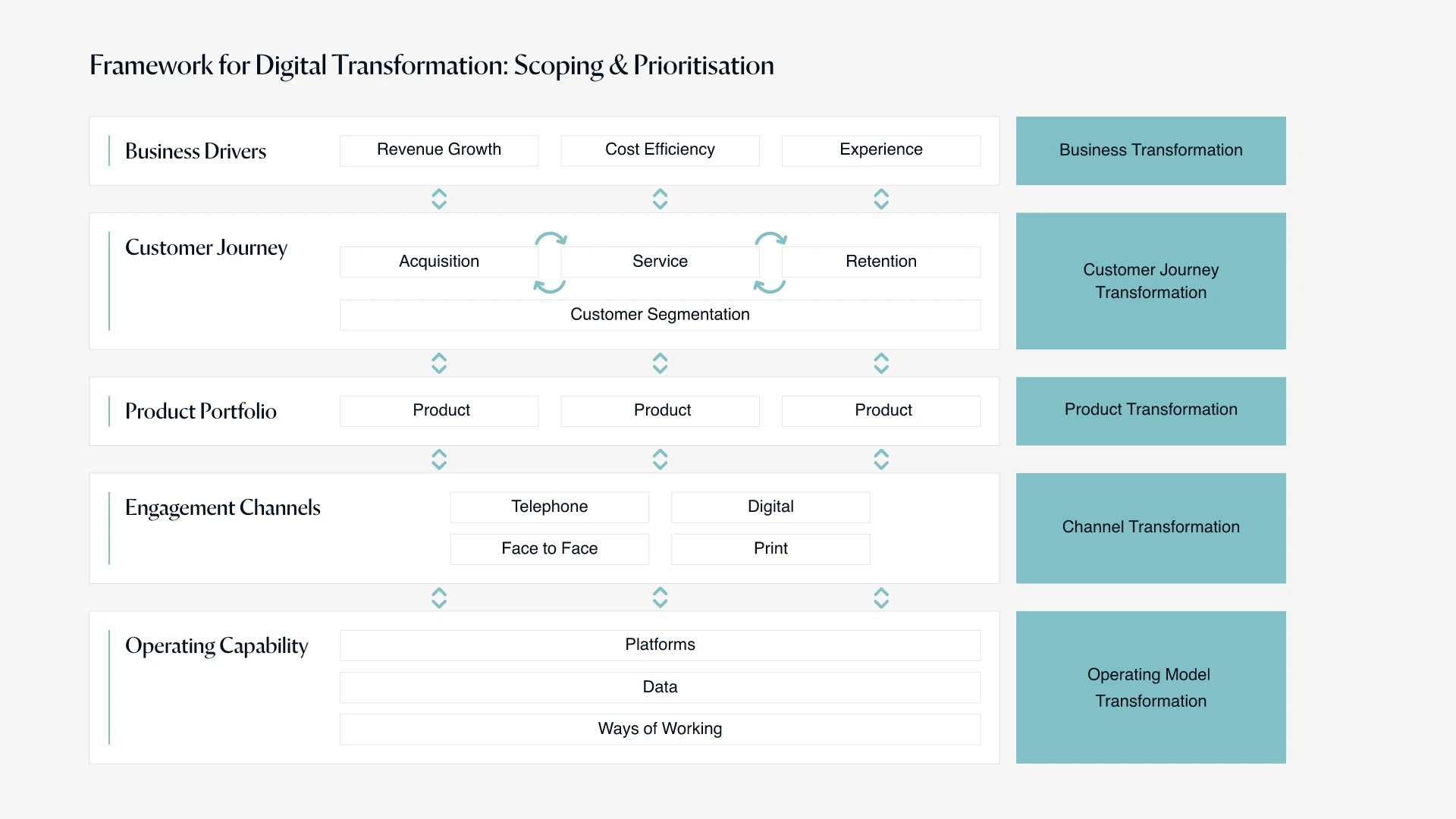
55% of companies without digital transformation believe they have less than a year before they start to lose market share. By 2026, global spending on digital transformation is forecasted to reach 3.4 trillion US dollars.
Here, we look at the top nine digital transformation benefits and why your company needs to accelerate digital transformation to avoid falling behind.
What is Digital Transformation?
You will have hopefully heard of the term ‘digital transformation’. But why is digital transformation important and what it is exactly?
In essence, digital transformation is the application of digital technology into all areas of a company to allow you to streamline business processes, improve user and customer experiences, and increase your bottom line.
What are the Key Digital Transformation Benefits?
The benefits of digital transformation are wide-ranging, and can improve everything from decision-making at the top levels of a business to an improved post-purchase customer experience.
1. Elevate organisational agility
Digital transformation increases the opportunity to improve business agility, helping your organisation stay on top of the latest trends, changes, and innovations. The ability to respond quickly to trends in consumer behaviour and market changes, as we all experienced as a result of the Covid-19 pandemic, is essential to future digital growth and the long-term survival of any business.
The Covid-19 pandemic highlighted the importance of being visible online and having the operational agility to enable remote work. Many companies rushed to move their business to the cloud or increased digital business initiatives, giving them an agile, competitive advantage over those who either didn’t or couldn’t move from legacy systems to embrace the change in the digital landscape at the time.
Changes brought about through successful digital transformation efforts continue to benefit organisations that chose to transform the way they work and how they communicate with their customers.
2. Increase profitability
A study by Valoir in 2021 reported that companies that lead the way with their digital transformation strategies are seeing double revenue growth than those who don’t invest. Even as far back as 2017, 85% said they had increased market share, and 23% expected higher revenue growth than competitors.
Digital transformation facilitates business growth in numerous ways.
Moving business operations online, and utilising digital technology to improve everything from productivity to user experience, can help you locate and fix lost revenue pinch-points, and see higher revenue growth than competitors with a non-digital business strategy.
3. Streamline digital processes, operational productivity and efficiency
Every day, the use of digital technologies helps organisations improve their productivity and operational efficiency. Digitisation as part of digital transformation enables businesses to streamline their digital processes and take advantage of workflow automation to reduce manual tasks and reduce human error in data collection and data entry.
By automating manual tasks, implementing digital workflows, and digitising paper-based processes, businesses can reduce errors, minimise delays, and increase the speed of operations. Additionally, digitisation can provide real-time data based insights, allowing businesses to make more informed decisions.
These digital improvements can lead to increased productivity, reduced costs, and a better overall customer experience. They can also lead to improvements with staff. Digital technologies can encourage collaboration and improve productivity, by allowing staff more time to attend to tasks that can’t be automated, such as procurement, human resources, supply chain, finance, and customer service.

4. Enhance data collection for improved decision making
Business intelligence software built into digital transformation initiatives can gather and analyse customer data which may have been previously unavailable for analysis or insight, or simply couldn’t be attributed to create a clear customer journey or path to conversion.
High-performance analytics offer highly informative data-based insights and provide a better understanding of customer behaviour, improved data management, and inspiring new ways to meet customer demands. These types of analytics-based tools can also enable teams to create custom reports, access business critical data and deliver information quickly and accurately.
See how DCX used insights from complex data analytics to identify a customer strategy that led to a 200% improvement in email engagement for leading pub retailer Greene King.
5. Boost customer satisfaction
One of the business benefits of digital transformation that also has a direct effect on the environment outside your business is its impact on customer experience – a primary focus for all industries.
Customers have high expectations, and delivering an intuitive customer experience is important in today's market. One of the most significant advantages of a digital transformation strategy is the ability to create tailored multi-platform experiences which target the right audience, at the right time, using data analysis.
Digital transformation helps to improve the customer experience and enhance customer service at every stage of the sales cycle through its tools and its overarching customer strategy providing a more efficient service that is less prone to errors, and based on data-driven decisions.
6. Unlock greater scalability
Business leaders who embed digital transformation as part of their underlying business strategy unlock greater flexibility for the long-term success of their business. Digitally-mature organisations can drive better business growth, safe in the knowledge that their business model offers the scalability and resilience required for long-term profitability and success.
Physical restrictions, incomplete data records, and manual tasks associated with on-site infrastructure can impede the digital transformation process, which requires fast and precise automated systems in order to produce success.
By using innovative tools, and embracing new technologies to consolidate existing systems, companies can improve business efficiency, reduce software costs, and benefit from increased digital resource capacity, as they scale.
Review how reliable and accurate your data is by booking a free data health check with DCX.
7. Improve resource management
One of the key benefits of digital transformation for many businesses is the ability to improve resource management. By using digital technology to improve and streamline processes, you can save time and free up working capacity that could instead be used to drive innovation and give your organisation a competitive edge.
Digital transformation can give employees more time to further drive business growth and innovation by automating repetitive and time-consuming tasks. Implementing new digital technologies can free employees from manual time draining tasks and shift their focus onto more value-added activities that require human skills such as creativity, problem-solving, and collaboration.
Additionally, digital technologies allow for remote work and collaboration, allowing employees to work from anywhere and collaborate with colleagues across the globe in real-time. This can enhance productivity, reduce commute time and costs, and increase employee satisfaction.
By empowering employees with more time and resources, businesses can foster a culture of innovation and creativity throughout the entire organisation, which could ultimately lead to new products, services, or processes that give the business a truly competitive edge in the market.
8. Build organisational resilience
Organisational resilience means having the ability to adapt, fast. Those organisations that are able to adapt and overcome swift changes or disruption in their business environment stand in a better stead to survive economic or industry-led downturns better than their competitors. High levels of organisational resilience can offer new opportunities for increased revenue, and help businesses forecast and realise their long-term growth projections.
Resilience is essential when it comes to thriving in the face of business change, whether that change be gradual or abrupt. Digital transformation helps to support this resilience by providing high levels of security and operational protection, and by creating an exceptionally secure framework which preserves function and data stability if a catastrophe were to strike.
9. Faster time to market
Digital transformation and new digital technology can support the speedy launch of new products and services at a lower cost.
With the help of digital tools and analytics, businesses can speed up their product development process from ideation to launch. For instance, businesses can use digital tools to collect customer feedback, conduct market research, and analyse data to identify trends and opportunities.
Plus, businesses can leverage cloud computing and digital infrastructure to scale their products and services rapidly, without significant upfront investment in physical infrastructure. This can reduce the cost and time required to bring a new product or service to the market.
Lastly, technologies can even facilitate the creation of new business models, such as subscription-based services or digital marketplaces, that can quickly reach a large audience and generate new revenue streams. By initiating digital transformation and adopting new digital technology, businesses can accelerate their product development and launch processes, reduce costs, and gain a competitive edge in their market.
Start your digital transformation journey
DCX can help your business with its digital transformation strategy. Offering a suite of digital transformation capabilities, we can help you improve business operations, boost customer experience, and give your brand a competitive advantage.
Looking to start your own digital transformation journey? Get in touch with us today.



